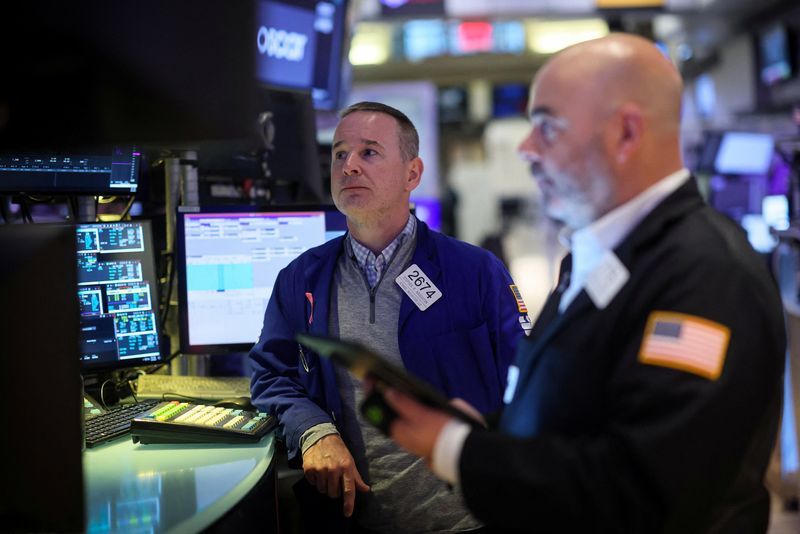By Sinéad Carew and Bansari Mayur Kamdar
(Reuters) -Wall Street's main indexes closed higher on Monday, with megacap growth stocks such as Alphabet (NASDAQ:GOOGL) and Tesla (NASDAQ:TSLA) supporting a rebound in technology-heavy Nasdaq while investors also waited anxiously for the U.S. Federal Reserve's meeting this week.
Google's parent Alphabet provided a sizeable boost to the market after a media report that Apple (NASDAQ:AAPL) is in talks to build Google's Gemini AI engine into the iPhone.
This supported the communication services sector, which ended up almost 3%, leading gains among the 11 major S&P 500 sectors after hitting its highest level since Sept. 2021.
Tesla shares finished up 6.3%, leading S&P 500 percentage gains, after the electric carmaker said it would soon increase the price of its Model Y EVs in parts of Europe.
Nvidia (NASDAQ:NVDA) shares added 0.7% but closed well below its session high. The artificial intelligence poster-child kicked off its annual developer conference as investors waited for new chip announcements from Chief Executive Jensen Huang.
Investors were torn between enthusiasm about the prospects for AI on the technology sector and worries ahead to the Federal Reserve's policy update on Wednesday, according to Lindsey Bell, chief strategist at 248 Ventures in Charlotte, North Carolina.
"This is a market that really wants to hold onto the momentum trade but what's really weighing on investors' minds is what happens with the Fed this week," said Bell.
"The market is sitting comfortably with the first cut coming in June or July but not entirely confident it'll be the case. The question is if it gets pushed out further."
The Dow Jones Industrial Average rose 75.66 points, or 0.20% , to 38,790.43, the S&P 500 gained 32.33 points, or 0.63%, to 5,149.42 and the Nasdaq Composite gained 130.27 points, or 0.82%, to 16,103.45.
The Nasdaq snapped three straight days of losses.
The Philadelphia Semiconductor index gave up gains to end the day virtually unchanged while the S&P 500 technology index finished up 0.5%.
Of the S&P's 11 major sectors the weakest were rate sensitive real estate and healthcare, with both off 0.02%.
Stronger-than-expected inflation figures have prompted traders to rethink when and by how much policymakers will lower rates this year, with traders pulling back the probability for a June rate cut to around 51% from about 71% just a week ago, according to the CME FedWatch Tool.
If the Fed were to take a hawkish tone when its policy meeting concludes on Wednesday, this could pressure stocks.
"The fact we're up today provides investors with an opportunity to take profits ahead of the Fed which is more likely to disappoint than to support the recent rally in risk assets," said Sameer Samana, Senior Global Market Strategist at Wells Fargo Investment Institute in Charlotte.
Goldman Sachs on Monday said they now expect three interest rate cuts in 2024, compared with four expected earlier, after inflation came in a bit firmer than expected.
"With the market near recent highs it's very difficult to see what could provide an upside spark from here. It's not hard to imagine the things that could cause disappointment," said Samana citing the Fed and high valuations for tech stocks.
Exchange operator Nasdaq said it resolved an issue related to connectivity and stock orders that had affected early trading for more than two hours on Monday.
U.S.-listed shares of Xpeng (NYSE:XPEV) added 1.9% on its plans to launch a cheaper EV brand amid fierce price competition.
Boeing (NYSE:BA) finished down 1.5% after a media report that a federal grand jury in Seattle issued a subpoena to the planemaker over the Jan. 5 midair blowout of a Boeing door plug on an Alaska Airlines flight.
Super Micro Computer (NASDAQ:SMCI), which joined the S&P 500 on Monday, gave up earlier gains to close down 6.4%, making it the biggest percentage decliner on the day in the benchmark index.
However, the stock, which has rallied furiously recently on bets it would benefit from AI, is still up more than 252% for the year-to-date.
Advancing issues outnumbered decliners by a 1.17-to-1 ratio on the NYSE where there were 224 new highs and 58 new lows.
On the Nasdaq 1,905 stocks rose and 2,400 fell as declining issues outnumbered advancers by about a 1.26-to-1 ratio.

The S&P 500 posted 41 new 52-week highs and one new low while the Nasdaq recorded 102 new highs and 131 new lows.
On U.S. exchanges 11.16 billion shares changed hands compared with the 12.41 billion average for the last 20 sessions.